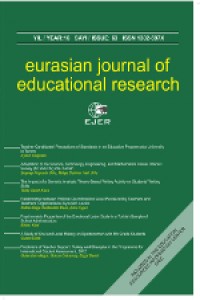Predictors of Teacher Support: Turkey and Shanghai in the Programme for International Student Assessment, 2012
Abstract
Problem Statement: Although teacher support is important for many
student outcomes, including academic achievement, attendance, wellbeing,
and dropout, related factors remain unexamined.
The Purpose of the Study: The aim of this study was to investigate predictors
of perceived teacher support of 15-year-old students who participated in
the 2012 Programme for İnternational Student Assessment in either
Turkey or Shanghai.
Method: In this basic research, secondary analyses were performed with
PISA 2012 data, and multiple linear regression analyses were used to
predict the variables that affect teacher support as perceived by students.
Findings: Results show that a sense of belonging at school, instrumental
motivation for mathematics, mathematics self-efficacy, and attitudes
toward school in terms of learning outcomes and learning activities are
predictors of teacher support in Turkey. İn Shanghai, teacher support was
predicted by a different set of variables, including mathematics teacher’s
classroom management, teacher behavior in terms of student orientation,
interest in mathematics, attitude toward school in terms of learning
outcomes, mathematics self-efficacy, and educational resources at home.
İn Turkey, the five affective variables explained only 13% of the variance, whereas in Shanghai, the six affective variables explained 24% of the variance.
Conclusion and Recommendations: In models of teacher support, Turkey and Shanghai differ, particularly in terms of total prediction levels, as the model constructed for Shanghai was more predictive than that for Turkey. The most predictive variable in Shanghai was teacher classroom management and, in Turkey, sense of belonging at school. Similarities did emerge, however; mathematics self-efficacy and attitudes toward school in terms of learning outcomes were predictors of teacher support in both countries. Since teacher support is important to students’ personal development, academic achievement, and well-being, the results can support the execution of educational activities in schools and the investigation of ways to increase such support.
Keywords: Predictors, multiple linear regression, teacher characteristics, affective characteristics
Details
| Journal Section | Articles |
|---|---|
| Authors | |
| Publication Date | April 15, 2016 |
| Published in Issue | Year 2016 Volume: 16 Issue: 63 |


